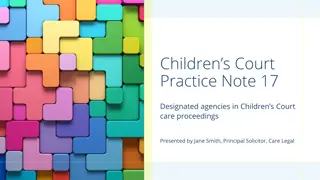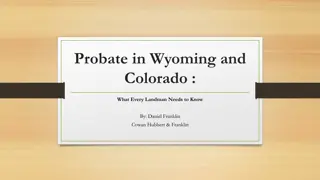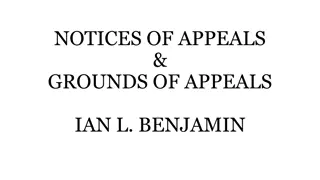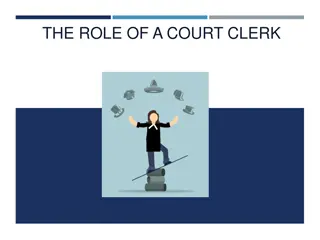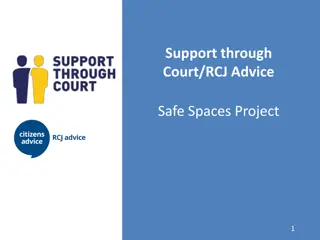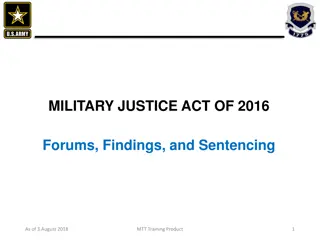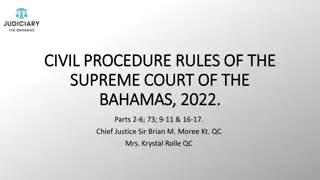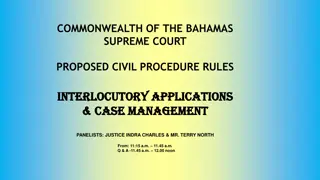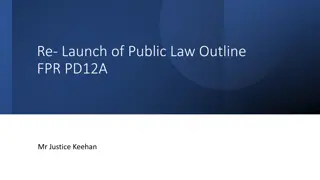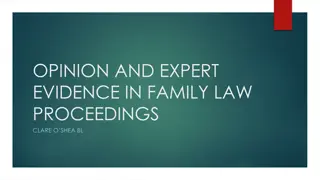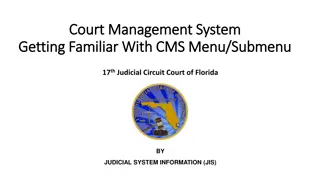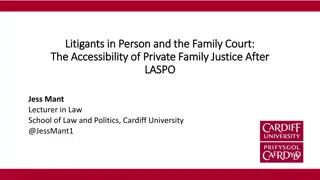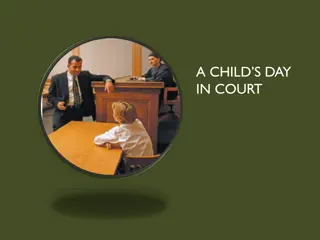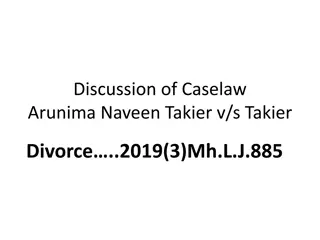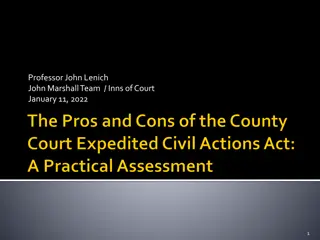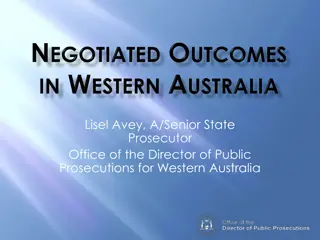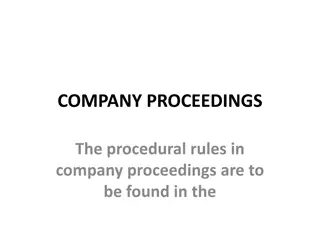Understanding Interlocutory Applications in Court Proceedings
Interlocutory applications are crucial in ongoing court cases, allowing parties to seek remedies, temporary reliefs, or address defects in the suit. These applications can be made in open court or to a judge in chambers through motions. Ex parte applications, made without notifying the opposing party, are permissible under certain conditions, but specific rules apply, especially for injunction requests. Various types of motions serve different purposes in court proceedings.
Download Presentation

Please find below an Image/Link to download the presentation.
The content on the website is provided AS IS for your information and personal use only. It may not be sold, licensed, or shared on other websites without obtaining consent from the author. Download presentation by click this link. If you encounter any issues during the download, it is possible that the publisher has removed the file from their server.
E N D
Presentation Transcript
INTERLOCUTORY APPLICATIONS 039 Lagos, O 43Abuja Interlocutory applications are applications made to the court during while an action is pending in court. While some of these applications are designed to remedy some defects in the pending suit, some are aimed at seeking some temporary reliefs etc.
It is not in all cases that there must be pending suit e.g. application stay of execution, application for installment payment application for order of certiorari, mandamus and prohibition are also interlocutory applications
MODE OF APPLYING TO COURT An interlocutory application is required to be made either in open court or to the Judge in chambers by way of motion. See O 43 R1 Abuja, O 39 R1 Lagos.
MOTION A motion is an application, usually in writing made to the court for order in terms of the prayers sought in the application.
TYPES OF MOTION MOTION EX PARTE MOTION ON NOTICE
MOTION EXPRTE It is an application for an order of court without the notice of the other party to the suit. Even where the party to be affected is in court he cannot respond to same. See 7-UP BOTTLING CO. V ABIOLA & SONS LTD (1995)2 SCNJ37, GOMBE V. PW NIG LTD (1995) 2 SCNJ 37.
Ex parte applications are normally permitted in two circumstances: Where time is of the essence Where from the nature of the application, the interest of the adverse party will not be affected negatively
NOTE: no application for an injunction can be made exparte except the applicant files with it a motion on notice. See O 43 R 3 Abuja and O 39 R 3 Lagos
ORDERS THE COURT MAY MAKE AFTER HEARING EX PARTE APPLICATION Grant the application Refuse the application Direct that the motion be served on the other party Order that the party sought to be affected appear in court within a given time and show cause why the order should not be granted. See O 43 R 7 Abuja, O 39 R 6 Lagos.
LIFE SPAN OF EX PARTE ORDER Any order obtained ex parte is expected to last for a short period. In Lagos, it shall abate after 7 days see O 39 R 3(3) Lagos. However, O 39 R3(4) gives the judge power to extend the period where necessary such extension shall not exceed 7 days.
In Abuja, it shall abate after 7 days see O 43 R 3(2) Abuja . However, O 39 R3(3) gives the judge power to extend the period where necessary such extension shall not exceed 7 days.
APPLICATION FOR INJUCTION NOTE: no application for an injunction can be made exparte except the applicant files with it a motion on notice. See O 43 R 3 Abuja and O 39 R 3 Lagos
MOTION ON NOTICE A motion on notice is one which is served on the other party and asking him to appear in court on named date for the hearing of same. Personal service of motion is not required unlike originating processes.
SERVICE OF MOTION In Abuja, there shall be at least 2 clear days between the date of service and hearing except there is leave of court to the contrary. O 43 R6 Abj In Lagos every motion must be served within 5 days of filing see O 39 R 3 Lagos. The respondent is expected to file counter within 7 days. See O 39 R 1(4) Lag, O 43R 1(3) The Applicant has 7 days to file reply if any. See O 39 R1(5), O 43 R1(4) Abuja
CONTENTS OF A MOTION Heading of the court The suit number Parties( applicant , respondent ) Type of motion ( ex parte or on notice) The order/ rule or law under which the application is brought. O 39 R1 Lag, O 43 R 1 Abuja, FALOBI V FALOBI
The notice itself.( TAKE NOTICE that .) The order or relief sought Date of the application Name, signature and address of applicant s counsel The name and address for service of the respondent or his counsel
HEARING OF MOTION A motion is heard when same is moved. The applicant or his counsel stands up in court when the application is called and restates the relief he has on the motion paper and urges the court to grant them.
OBLIGATION TO HEAR EVERY MOTION Once an application has been filed except it is withdrawn, the court is duty bound to hear the application and make pronouncement. See DANDUME LGC V YARO (2011) 11 NWLR(PT1257)159 Where a motion for extension of time to file defence was not heard and judgment was delivered. It was set aside on appeal.
ORDER OF HEARING MOTIONS Where there are two pending motions, one seeking destroy and another seeking to save, the one seeking to save will be heard first. See AG FED V. AIC LTD, LONG JOHN V .BLAKK & ORS
AFFIDAVITS Every motion shall be supported by an affidavit. See O 43 R 1 Abuja, O 39 R1(1) Lagos. Where the application is one brought on point of law there need not be an affidavit see EREJUWA II V. DEDUWA (1970) MSNLR15
CONTENTS OF AFFIDAVITS Heading of court before which the oath is sworn The suit number where it has been given The names of parties The application which the affidavit supports. E.g. affidavit in support of motion on notice
Name, nationality, religion profession and address of deponent Where deponent is not a party, the person by whose authority he deposes Where the facts are not within his knowledge, the source of his knowledge or information The oath clause Signature and official stamp of commissioner for oaths
COUNTER AFFIDAVIT A party who intends to oppose an application is required to file a counter affidavit opposition. Where a respondent fails to file a counter affidavit the facts deposed to in the affidavit are deemed true. See A.G FED V BAYAWO Where the respondent intends to rely on points of law alone, he needs not file a counter affidavit. See BADEJO V. MINISTER OF EDUCATION
FURTHER AFFIDAVIT If the applicant, upon being served with the counter affidavit, sees the need to oppose the facts deposed to in the affidavit, he is expected to file a further affidavit it.
CONFLICTS IN AFFIDAVITS Where there is a conflict in affidavits of parties the court has a duty to resolve the differences by calling oral evidence. See FALOBI V. FALOBI and section 116 Evidence Act.
PROPRIETY OF COUNSEL DEPOSING TO AN AFFIDAVIT Counsel must avoid the habit of deposing to an affidavit on behalf of client. In the event of conflicts he will be required to enter the witness box and be subjected to the rigours of cross examination. See OKPABIO V. NIGERIAN FILMS & CENSORS BOARD
SOME SPECIFIC INTERLOCUTORY APPLICATIONS Application for injunction Application for anton piller injunction Application for mareva injunction Third party proceedings Interpleader proceedings
APPLICATION FOR INJUNCTION An injunction is a court order commanding (mandatory injunction) or preventing an action. See O 38 R 8 Abuja, O 42 R8 There are two types: Interim injunction Interlocutory injunction
INTERIM INJUNCTION It is a temporary order of court granted to preserve the res until a named date or hearing of the motion on notice It is granted in urgent situation It is normally ex parte It has a short life span See KOTOYE V. CBN, P 39 R1(2) Lag, O 43 R1(2) Abuja
INTERLOCUTORY INJUNCTION It is granted after parties have been heard and it is to last during the pendency of the suit It is through motion on notice
CONDITIONS FOR GRANT OF INTERLOCUTORY INJUNCTION Existence of legal right Substantial issue to be tried Balance of convenience Irreparable damage or injury Conduct of the parties Undertaking as to damages See OBEYA MEMORIAL HOSPITAL V AG FEDERATION
MANDATORY INJUCTION It is an order compelling a party to do an act
ANTON PILLER INJUNCTION It is granted ex parte permitting the applicant to enter into the respondent premises to seize, detain and preserve goods or articles in possession of the respondent It is granted in case of infringement of copy right, trademark, patent See ANTON PILLER K,G V. MANUFACTURING PROCESSES LTD
MAREVA INJUNCTION This is an order restraining a defendant from removing his assets within jurisdiction so not to render a judgment nugatory. See MAREVA COMPANIA NAVIERA V INTERNATIONAL BULK CARRIER LTD
THIRD PARTY PROCEEDINGS A procedure where by a defendant through an application brings a person who is not initially sued as a party for the purpose of contribution, indemnity or other relief connected with the claimant s claim against the defendant. See O 13 R 19(1) Lagos, O 10 R 18(1) Abuja
PROCEDURE Exparte motion supporting by affidavit Stating the fact that to the defendant s belief that such a third party may bear the eventual liability. Written address If granted third party notice will be issued and served on the third party together with the writ of summons and other processes. See 0 13 R 19(2) Lag, O 13 R 21(2) Abuja
EFFECT OF SERVICE OF THIRD PARTY NOTICE Once the third party notice is served on the third party it has following effects: The third party is required to enter appearance within the prescribed time by rules either 8 days or 30 days. O 13 R 20 Lagos and not later than 35 days unless otherwise ordered by the court. O 13 R 22 Abuja
The third party becomes a defendant to the party who brought him in. The third party is not a co-defendant as the claimant s writ does not recognize him. See JOHNSON V RIBBINS, OKAFOR V ACB It is an independent suit that even if the main suit is struck out it will still continue. See UBN V EDIONSERI
DEFAULT OF APPEARANCE Failure to enter appearance and filing of pleadings shall be deemed admission and the third party shall be bound by the judgment. See O 13 R 21 Lagos, O 13 R 24 Abuja.
THIRD PARTY DIRECTION Once the third party is served and has enter appearance. Prior to his entry of appearance proceedings must have taking place without him. The defendant calling him will apply for direction as to subsequent conduct of the proceedings. The application is by motion on notice to be served on the third party and the claimant
THE OBJECTION THE CLAIMANT MAY RAISE The joinder may delay his suit unduly or the joinder will embarrass him He may incur additional cost The question raised in the third party notice cannot completely disposed of in his action. See BARRISTER V FRANCE
THE OBJECTION THE THIRD PARTY MAY RAISE The defendant has no claim against him The case does not fall under any of the recognized cases where third party notice should be issued.
THE ORDER THE COURT MAY MAKE Judgment will be enter where liability of the third party to the defendant is established. Dismiss the application
INTERPLEADER People often find themselves in possession of property or money claimed by two or more persons. The person in possession becomes confused as to who is the right owner Delivery to one person may result to a suit against him by the other
To avoid this the party in possession applies to court by way of interpleader to compel the claimants to interplead (take proceedings between themselves to determine who is entitled to the subject matter See O48 R 1 Abuja, O 43 R1 Lag , NWEKESON V ONUIGBO
TYPES OF INTERPLEADER Sheriff interpleader Stakeholder interpleader
PROCEDURE FOR INTERPLEADER ABUJA, see O 48 R 6 By way of summons Where a suit is pending it will be by motion LAGOS, see O 43 R 6 By way of summons
WHAT THE AFFIDAVIT FOR AN INTERPLEADER SHOULD CONTAIN That the applicant has no interest in the subject matter That the applicant has not colluded with any of the claimant That the applicant is wiling to transfer or dispose of as the court may direct
SHERIFFS INTERPLEADER Where a sheriff carries out attachment pursuant to a judgment and a third party is laying claim in the property to be attached. It is applicable when the goods or chattel of a person who is not named in the writ of fi fa is attached. See KEY STONE BANK LTD V M &M LTD
The third party and the judgment creditor are called upon to substantiate the claim. It operates as a stay pending the determination of the matter. See SHELLE V OSHUN



